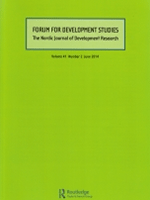Author
Dan Banik and Arve Hansen
Abstract
It is difficult, if not impossible, to satisfactorily answer the question ‘Why does poverty persist?’ Nonetheless, there appear to be two approaches that can provide a useful start. One alternative is to examine why poverty (and extreme forms of it) continue to persist in the poorest countries of the world, mainly in Sub-Saharan Africa. The other, which is the focus on this article, is to examine a set of factors or reforms that have worked in reducing poverty in middle-income countries of the ‘Emerging South’ and the challenges these countries continue to face in distributing the benefits of economic growth and addressing persistent levels of poverty within their borders. We aim to better understand successful attempts to reduce poverty in a selected few emerging economies – India, China and Vietnam – by examining the role of specific types of reforms and initiatives in shaping and determining action by national governments to reduce poverty. Do some of these emerging economies advocate and adopt different poverty-reduction policies? If so, what, how and why? And to what extent can some of these poverty-reduction models be usefully applied in other developing country contexts? We then identify and discuss two broad sets of frontiers of research and policy-making on poverty in emerging Asia – environmental challenges and growing inequality – that require considerable attention if India, China and Vietnam are to experience continued economic growth and poverty reduction.
